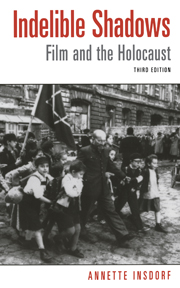Book contents
- Frontmatter
- Contents
- Foreword by Elie Wiesel
- Preface
- Introduction
- I Finding an Appropriate Language
- 1 The Hollywood Version of the Holocaust
- 2 Meaningful Montage
- 3 Styles of Tension
- 4 Black Humor
- II Narrative Strategies
- III Responses to Nazi Atrocity
- IV Shaping Reality
- V Third Edition Update
- Annotated Filmography (Third Edition)
- Filmography (Second Edition)
- Notes
- Bibliography (Second Edition)
- Bibliography (Third Edition)
- Relevant Websites
- Index
1 - The Hollywood Version of the Holocaust
Published online by Cambridge University Press: 14 January 2010
- Frontmatter
- Contents
- Foreword by Elie Wiesel
- Preface
- Introduction
- I Finding an Appropriate Language
- 1 The Hollywood Version of the Holocaust
- 2 Meaningful Montage
- 3 Styles of Tension
- 4 Black Humor
- II Narrative Strategies
- III Responses to Nazi Atrocity
- IV Shaping Reality
- V Third Edition Update
- Annotated Filmography (Third Edition)
- Filmography (Second Edition)
- Notes
- Bibliography (Second Edition)
- Bibliography (Third Edition)
- Relevant Websites
- Index
Summary
Few American films have confronted the darker realities of World War II – ghettos, occupation, deportation, concentration camps, collaboration, extermination. The Holocaust has been only touched upon in such Hollywood studio productions as Exodus, Cabaret, Ship of Fools, Marathon Man, Julia, The Boys from Brazil, and Victory, and brought to the fore in only a handful of postwar films like Judgment at Nuremberg, The Diary of Anne Frank, Voyage of the Damned, and – increasingly – movies made for television. When “Judgment at Nuremberg” was first presented as a teleplay on Playhouse 90 in 1959, however, commerce clearly got in the way of authenticity: the sponsor of the show, the American Gas Association, objected to the use of the word “gas” in reference to the concentration camp death chambers. According to the producer Herbert Brodkin, the sponsor wanted it deleted; he refused; they got their way behind his back: “Although the program was televised live, CBS delayed its transmission for a few seconds, long enough for an engineer to bleep out the word gas each time it was mentioned.” The major difference between “telefilms” like Holocaust and Playing for Time and theatrically distributed features is the commercial interruptions to which the former are subject. In conception, style, and appeal to a mass audience, nevertheless, these are “Hollywood” films, simply made for a smaller screen. Moreover, in the cynically realistic appraisal of screenwriter Paddy Chayefsky:
NBC wanted to do The War Against the Jews. That's before they did Holocaust. I said the subject was simply too painful for me to write about. […]
Information
- Type
- Chapter
- Information
- Indelible ShadowsFilm and the Holocaust, pp. 3 - 26Publisher: Cambridge University PressPrint publication year: 2002
